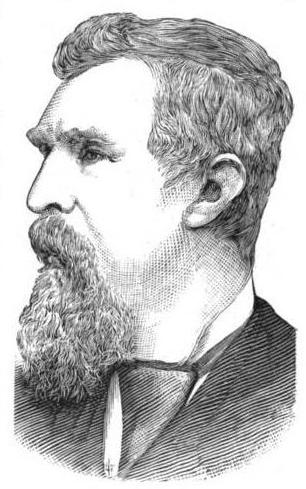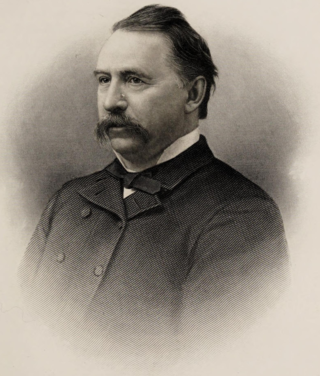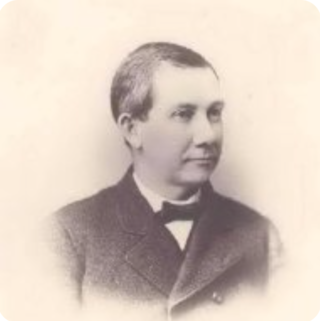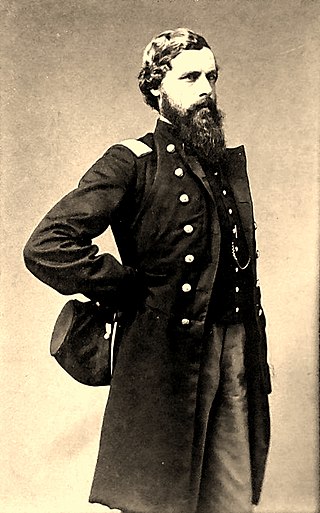Related Research Articles

Henry Smith was a millwright, architect, builder and politician who was elected a member of the United States House of Representatives from Wisconsin from 1887 - 1889 as a member of the Union Labor Party. He also served as a Socialist member of the Wisconsin State Assembly in 1878. At different times, Smith ran for office on the Socialist, Greenback, Democratic and Union Labor tickets.

Thomas Richard Hudd was an American lawyer and Democratic politician from northeast Wisconsin. He served three years in the U.S. House of Representatives, representing Wisconsin's 5th congressional district from 1886 to 1889. He previously served 10 years in the Wisconsin Senate and two years in the State Assembly, and served various local offices.

John Winans was an American lawyer and Democratic politician from Janesville, Wisconsin. He served one term in the U.S. House of Representatives, representing Wisconsin's 1st congressional district during the 48th Congress (1883–1885). He then served as the 25th mayor of Janesville, from 1885 to 1889. Earlier, he represented Janesville and central Rock County for six years in Wisconsin State Assembly.
John Lagrand was a Republican member of the Wisconsin State Assembly from Milwaukee for one term (1885–86), representing the Sixth Assembly district of Milwaukee County.

Edward Keogh was an Irish American immigrant, printer, Democratic politician, and pioneer settler of Milwaukee, Wisconsin. He served 17 years in the Wisconsin State Assembly between 1860 and 1895, representing Milwaukee's 3rd ward, and was the 37th speaker of the Assembly. He also served two years in the State Senate.
The Reform Party, also called Liberal Reform Party or People's Reform Party, was a short-lived coalition of Democrats, reform and Liberal Republicans, anti-temperance forces, and Grangers formed in 1873 in the U.S. state of Wisconsin, which secured the election for two years of William Robert Taylor as Governor of Wisconsin, as well as electing a number of state legislators.
Casper H. M. Petersen was an American schoolteacher, businessman and farmer from New Holstein, Wisconsin, who spent four non-consecutive terms as a Democratic member of the Wisconsin State Assembly from Calumet County, Wisconsin.
Owen King was a lumber dealer from Helena, Wisconsin, who served two terms in the Wisconsin State Assembly representing part of Iowa County, being elected in 1874 as a Reform Party member, then in 1877 as a Greenbacker.
Christian Ellefson was an American farmer from the Town of Franklin, in Vernon County, Wisconsin who served two separate one-year terms as an Independent Greenback member of the Wisconsin State Assembly.
Joseph Hamilton was an American printer, newspaper editor, and life insurance agent from Milwaukee, Wisconsin who spent two one-year terms as a member of the Wisconsin State Assembly: in 1874 as a member of the short-lived People's Reform Party, also known as the Liberal Reform Party, and in 1877 as a Democrat.

Richard Dewhurst was an English American immigrant, lawyer, judge, businessman, and politician. He served in the Wisconsin State Assembly for four non-consecutive terms over four different decades under four different political party labels ; and was defeated twice when running for election on the ticket of a fifth party, the Democratic.
Samuel Decius Hubbard was an American farmer, livestock dealer, and politician who served four discontinuous terms over three decades as a member of the Wisconsin State Assembly. He also served as a Union Army officer during the American Civil War.
Michael Johnson was an American farmer from Springdale, Wisconsin, who served as a member of the Wisconsin State Assembly from Dane County, as well as holding various local offices.
Jacob Sander (1828–1904) was an American cattle dealer from Milwaukee, Wisconsin who served a single term as a Liberal Reform Party member of the Wisconsin State Assembly.
Henry Cook Mumbrue was an American steamboat operator, businessman, and Wisconsin pioneer. He served in the Wisconsin State Senate (1877–1878) and Assembly (1876), representing Waupaca County. He was at one point the richest resident of Waupaca County, but his riverboat business was wiped out when train lines arrived in the region. His name is often abbreviated as H. C. Mumbrue.
Philo Quincy Boyden(1829–1922) was an American pharmacist from Hudson, Wisconsin, who served two one-year terms as a member of the Wisconsin State Assembly.

Thomas Robert Wall was an American lumberman, banker, farmer and politician.
Thomas Carmichael was an Irish-American lumberman and politician from Eau Claire, Wisconsin, who spent four discontinuous terms as a member of the Wisconsin State Assembly.

Thomas Curley was an Irish American farmer, soldier, and Democratic politician. He was a member of the Wisconsin State Assembly, representing Crawford County in the 1883 and 1885 sessions. During the American Civil War, he served as an officer in the Union Army, rising to the rank of brigadier general.

James Warner Ostrander was an American furniture manufacturer, banker, and Republican politician. He served four non-consecutive terms in the Wisconsin State Assembly representing southern Jefferson County. He also served in several county offices in Jefferson County.
References
- ↑ "Members of the Wisconsin Legislature 1848–1999 State of Wisconsin Legislative Bureau. Information Bulletin 99-1, September 1999. pp. 12, 81 Archived December 9, 2006, at the Wayback Machine
- ↑ Turner, A. J., ed. The legislative manual of the state of Wisconsin: comprising the constitutions of the United States and of the state of Wisconsin, Jefferson's manual, forms and laws for the regulation of business; also, lists and tables for reference, etc. Thirteenth Annual Edition. Madison: Atwood and Culver, Printers and Stereotypers, 1874; pp. 351, 475, 479, 480
- ↑ Bashford, R. M., ed. The legislative manual of the state of Wisconsin: comprising the constitutions of the United States and of the state of Wisconsin, Jefferson's manual, forms and laws for the regulation of business; also, lists and tables for reference, etc. Fifteenth Annual Edition. Madison: B. Bolens, State Printer, 1876; p. 387
- ↑ "Donald A. McDonald" in, History of La Crosse County, Wisconsin: Containing an Account of Its Settlement, Growth, Development and Resources : an Extensive and Minute Sketch of Its Cities, Towns and Villages-their Improvements, Industries, Manufactories, Churches, Schools and Societies : Its War Record, Biographical Sketches, Portraits of Prominent Men and Early Settlers : the Whole Preceded by a History of Wisconsin, Statistics of the State, and an Abstract of Its Laws and Constitution and the Constitution of the United States Chicago: Western Historical Company, 1881; p. 773
- ↑ U.S. Patent grant #254995A, March 14, 1882
- ↑ Heg, J. E., ed. The blue book of the state of Wisconsin 1883 pp. 482, 509
- ↑ Heg, James E., ed. The blue book of the state of Wisconsin. Comprising the constitutions of the United States and of the state of Wisconsin, Jefferson's manual, forms and laws for the regulation of business; also lists and tables for reference, etc. Twenty-Third Volume. Madison: Democrat Printing Co., State Printers, 1885; pp. 425, 442, 451
- ↑ Morser, Eric. "A Hinterland Cauldron: Workers, Politics, and the Remaking of a Midwestern City" Journal of Urban History September 2011 (vol. 37 no. 5), p. 716